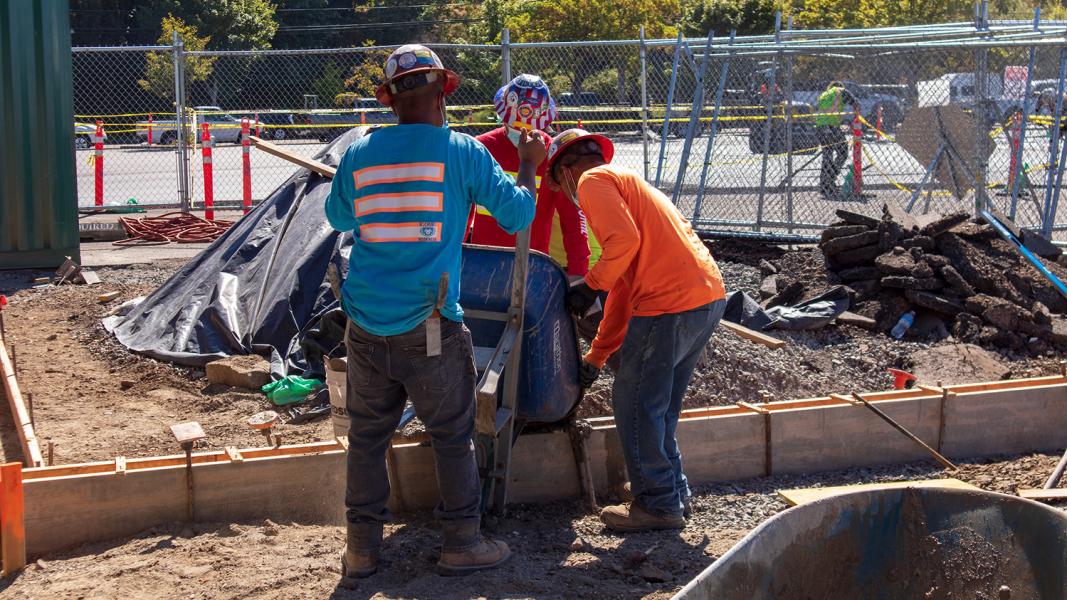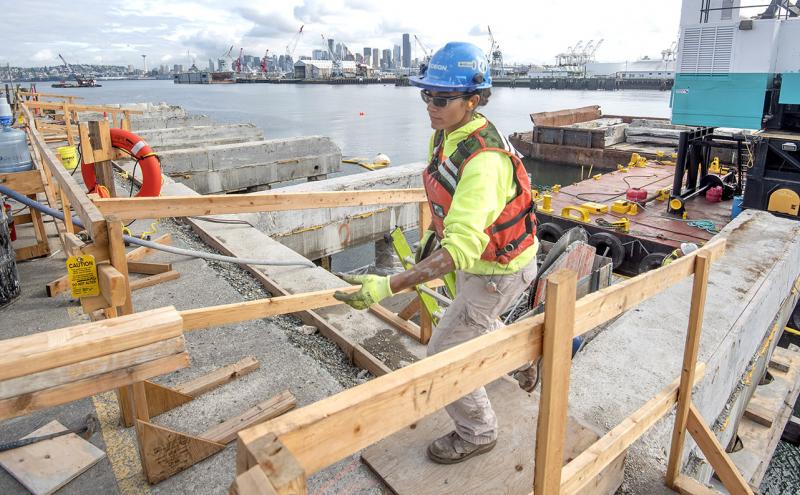
Uprooting your life and enrolling in a pre-apprenticeship program can be daunting for anyone, but for those without a support system or facing financial barriers, completing the unpaid program can be nearly impossible.
Cares of Washington is here to help. The non-profit organization operates on the fact that people need people more than they need a social media blast with information or a list of email addresses and websites.
“Every single one of us uses a support system; Cares offers a support system to help people figure out life issues,” said Ruth Harmony, Program Manager for Cares of Washington.
Cares of Washington supports people with disabilities and low incomes to realize their purpose, potential, and strength. Its Connect for Success program supports BIPOC communities living around Port of Seattle facilities to enter and successfully complete pre-apprenticeship programs in Port-related industries such as construction, green industries, manufacturing, and aerospace. Connect for Success was created to reduce employee turnover, increase productivity, and support career advancement by reducing the obstacles and challenges that keep employees from performing their best at work.
“[Port-related] industries can be difficult to get into because it takes time and resources that many do not have,” Harmony said.
Cares and Connect for Success are funded entirely through grants, including a Port of Seattle South King County Community Impact Fund Economic Recovery Grant, awarded through the first grant cycle in 2020. The Port grants program awards contracts to organizations serving communities most deeply impacted by the current economic crisis and connected to Port-related industries.
Removing barriers
Pre-apprenticeship programs are usually unpaid, requiring participants to forgo a paycheck for the duration of the 11-week program. Lack of access to childcare and transportation options can also add additional barriers. This can be hard for many to swing without support. By supporting participants’ needs, programs like Connect to Success can make a significant impact on pre-apprentice retention.
To connect with clients who might need extra help, Cares works closely with pre-apprentice organizations to provide one-on-one support to clients, and identify and remove barriers that prevent them from succeeding in the industry.
Jerry Jordan, Director of the Pre-Apprenticeship Construction Training (PACT) Program, said PACT’s partnership with Cares helps ensure pre-apprentices are supported throughout and even after the program, until they are able to find financial stability in their work.
“Cares builds relationship with pre-apprentices and fills in the gaps for us to make sure all participants have access to the help they need,” he said. “We are two entities with the same mission of helping individuals.”
The two organizations work together to help clients find survival jobs to alleviate financial stresses while they are in the program.
“Cares is focused on that transition and providing support that helps them to stay on task and in the program,” he said.
Based on past struggles, he said many people are slow to open up and put their trust in someone, and won’t always admit when they need help. The collaboration between the two organizations allows them to reach more people and allow pre-apprentices to make connections with someone they feel comfortable sharing their needs with.

Personalized support
Cares uses a personalized approach where each client works with just one coach who tailors services to meet an individual's needs.
“At Cares we assess clients’ basic needs first – do they have food? Are they safe? We address that immediately. Do they have gas to get to work? We address that in the same day or within a few hours,” Harmony said.
By working with clients one-on-one, coaches are able to garner trust really quickly with the client, Harmony said.
“The client discloses what is going on in their life, whether it be budgeting, mental or physical health, addiction, or housing, legal, or transportation issues, and we refer them to resources and then make sure they can access the referral. The client continues to work with us while dealing with the issue. Many of them have not had a support system until now. We connect with the community, work with different systems in communities, like housing, and schools, and help them form support systems for themselves.”
Despite what life throws at clients, Cares coaches can make a huge difference by being a “person in their corner.” When one client skipped out on a meeting with his parole officer to take a forklift class, Cares convinced the officer to put him in a drug treatment program rather than jail. Cares supported him throughout his journey to get clean and sober. When he faced additional challenges – his brother died of a drug overdose and he got COVID – the Cares team stayed in his corner. He was able to remain sober and got accepted into a carpenter apprenticeship program, and Cares helped set him up with tools and gear, housing, and other resources.
“He is a really good carpenter,” Harmony said. “He is on a positive career and personal track and is going to change his life. He is clean and sober.”
Quick response
Cares is able to reach those who need help by presenting during pre-apprentice program coursework. Anyone who needs help can enroll.
“The time it takes to enter the Cares Connect for Success program is incredibly short,” Harmony said. “We have a goal to help each person with one meaningful issue in their life in the first 24 hours within meeting them. Time is expensive when you are poor and it takes time to navigate these resources.”
Having that support can make all the difference for pre-apprentices. In 2020:
- At least 50% of construction apprentices in the Puget Sound area did not complete their apprenticeship to become journey workers. The number is much lower for BIPOC communities and those living in distressed zip codes
- Largely because Cares works with folks from the first day of pre-apprenticeship, the retention rate of apprentices who have worked with Cares is over 90%, with the majority of them being BIPOC, women, and those living in distressed zip codes
Equitable recovery
Cares helps support an equitable recovery because it opens up access to a high-paying industry that can change lives. Those who make it through the pre-apprentice and apprenticeship programs will see a big financial payoff. A journey person can make a six-figure income, a salary likely not accessible for them or their families before.
Programs like Connect for Success result in better jobs and inclusive economic growth in Washington State, contributing to a thriving workforce that benefits employers, employees, and the community.
“It can really change lives for people who never had access before,” Harmony said. “It breaks a cycle of generational inequity. The majority of folks we’re working with are people of color and women. It’s a lot harder for people who don’t have that history in the industry to get into the industry.”









